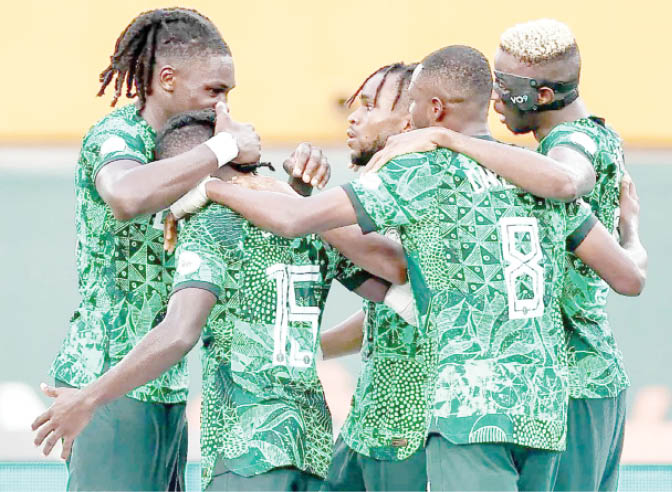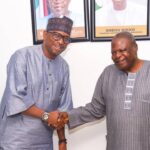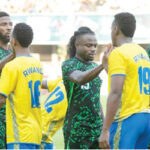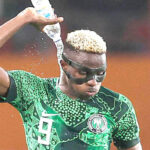Since Nigeria’s return to democratic rule in 1999, sports, like other sectors, have been administered by civilians, bringing with it several moments of elation and, at other times, despondency.
Before this period, under military regimes, concerted efforts were made to uplift the sector by providing sporting facilities and ensuring athletes participated in international competitions. While some of these efforts were consolidated after the return of democratic rule, experts believe there is still more to be done.
Before 1999, Nigerian athletes excelled at major international competitions: the Green Eagles’ victory at the 1980 Africa Cup of Nations (AFCON), the Super Eagles’ World Cup debut in 1994, and Team Nigeria’s best Olympics appearance in 1996.
Since 1999, athletes like Tobi Amusan, Ese Brume, John Obi Mikel, Victor Osimhen, Ademola Lookman, and Blessing Oborududu, along with those who made their names before the return of democracy like Kanu Nwankwo, Jay-Jay Okocha, and Chioma Ajunwa, among others, have kept Nigeria prominent in world sports.
- Pastor ‘s wife kidnapped, abductors demand N32m
- Katsina gov commissions N2.1bn road named after him in Sokoto
However, it has been a mix of celebrations and disappointments.
High moments
Here, Daily Trust reviews the successes in Nigerian sports since the return of democratic rule.
Football
While Nigeria is yet to lift the FIFA World Cup in both the men’s and women’s categories, there have been joyful moments in Nigerian football from 1999 to now. Enyimba brought glory to the country by winning the CAF Champions League back-to-back in 2003 and 2004, an achievement that took 38 years.
The Super Eagles, under Stephen Keshi, won their third AFCON title in 2013 in South Africa. That same year, the Golden Eaglets won their fourth World title in the United Arab Emirates, and two years later, they defended their title in Chile for a historic fifth title.
In 2022, the women’s national U-17 team, the Flamingos, made history by becoming the first African team to win bronze at the FIFA World Championship in India. The Super Falcons also defeated South Africa’s Banyana Banyana to qualify for the Paris Olympics, their first appearance since the 2008 Olympics in Beijing.
Nigeria’s performance at the 2023 CAF Awards was a high point for Nigerian sports. Victor Osimhen was crowned African Footballer of the Year, while Asisat Oshoala won African Women’s Footballer of the Year for the sixth time, and Chiamaka Nnadozie was named Women’s Goalkeeper of the Year.
Ademola Lookman also made history as the first player to score a hat-trick in the final of the new format of the UEFA Europa League, leading Atalanta to victory against Bayer Leverkusen in Dublin and earning the MVP of the 2024 final.
Athletics
In 2013, Blessing Okagbare clinched silver and bronze medals in the long jump and 200-metre events at the World Athletics Championship. In 2015, she earned a spot in the Guinness Book of Records for competing 38 times in the Diamond League’s 100m, 200m, and long jump events.
Tobi Amusan made history by becoming the first Nigerian to be crowned African, Commonwealth, and World champion in the same year, setting a new world record with a time of 12.12 seconds at the World Championship in Oregon. Ese Brume also won bronze in the long jump at the 2020 Tokyo Olympics.
Basketball
D’Tigress made it to the 2023 World Cup in Spain, reaching the quarterfinals and finishing 8th overall. They won the Women’s Afrobasket Championship four consecutive times from 2017 to 2023. D’Tigers also made history in 2012 as the first African nation to qualify for the Summer Olympics through the FIBA World Olympic Qualifying Tournament and won their first FIBA Africa title in 2015. D’Tigress has qualified for the 2024 Paris Olympics again.
Wrestling
Nigerian female wrestlers have dominated the sport in Africa and beyond. Blessing Oborududu, the twelve-time African champion from 2010 to 2023, who currently ranks as the No. 2 woman wrestler in the world, won a silver medal at the 2020 Tokyo Olympics. Also, Odunayo Adekuoroye made history by becoming the first African female wrestler to win a medal at the World Wrestling Championship in 2015.
Paralympic
Nigeria has also seen remarkable success in paralympic sports. At the 2008 Beijing Paralympics, Nigeria won four gold medals, two silver, and one bronze, marking a significant achievement. Lucy Ejike, who has set multiple world records in powerlifting, continues to inspire new generations of athletes. The achievements of Paralympic athletes often highlight the potential within Nigerian sports, despite limited resources and support.
Growth of Domestic Leagues
In addition to international success, there has been growth in domestic leagues, particularly in football and basketball. The Nigeria Professional Football League (NPFL) has seen increased competition and talent development. Clubs like Enyimba and Kano Pillars have not only dominated domestically but also represented Nigeria in continental competitions. The growth of the league has provided a platform for young talents to showcase their skills and secure moves to top European clubs.
In other sports, Wellington Jighere became the first African player to be crowned World Scrabble Champion in 2015. Paul Kehinde, a powerlifter, won gold at the Rio 2016 Games, breaking the world record twice and lifting 220 kg. Samuel Peter won the WBC heavyweight title in 2008. Nigeria hosted and won its first African Games title in 2003, and Team Nigeria had its best performance at the 2022 Commonwealth Games in Birmingham, finishing 7th overall with 34 medals.
Low Moments
Despite the highs, the period under review has also seen disappointing performances. While there have been moments of pride and triumph, there are instances where Nigeria’s potential in sports has not been fully realised. Despite the abundance of talent, various factors, such as inadequate funding, a lack of infrastructure, and poor management, have hindered the growth and success of many athletes.
Football
The Super Eagles have failed to break the FIFA World Cup semi-final jinx and did not qualify for the 2006 and 2022 editions. They also failed to qualify for the AFCON in 2015 and 2017 consecutively. Both the Olympic Eagles and the Super Falcons failed to qualify for the 2020 Tokyo Olympics.
Doping Bans and Charges
Divine Oduduru received a six-year ban for breaking anti-doping regulations. Blessing Okagbare was banned for 10 years for failing a doping test. Grace Nwokocha received a three-year ban for doping violations, leading to Nigeria being stripped of its gold medal in the 4×100 meters relay at the 2022 Commonwealth Games. Tobi Amusan was charged with missing a doping test and failed to defend her world title at the 2023 World Athletics Championship, though she later claimed her third consecutive Diamond League title.
D’Tigers’ failure to qualify for the 2024 Olympics
D’Tigers failed to qualify for the basketball event at the Paris Olympics, missing the Olympics for the first time since 2008. The team did not secure a ticket at the FIBA Olympic pre-qualification tournament held in Lagos.
Challenges
One of the major challenges that have also plagued Nigerian sports over the years has been that of underfunding and corruption. Many promising athletes lack the financial support necessary to train and compete at the highest levels. The mismanagement of funds and resources meant for sports development has been a persistent issue.
Nigeria has also missed several opportunities to host major international sporting events that could have further boosted the country’s profile in the global sports arena. Hosting such events often brings economic benefits, enhances tourism, and provides an impetus for infrastructural development. However, insecurity, logistical challenges, and financial constraints have prevented Nigeria from capitalising on these opportunities.
Apart from these underwhelming performances, Nigeria still faces a dearth of facilities for training, constant wrangling on sports federation boards, and the absence of the National Sports Commission (NSC) Bill, which would return sports administration to technocrats. Currently, the Ministry of Sports, manned by politicians, runs the sector, contrary to international best practices.

 Join Daily Trust WhatsApp Community For Quick Access To News and Happenings Around You.
Join Daily Trust WhatsApp Community For Quick Access To News and Happenings Around You.


